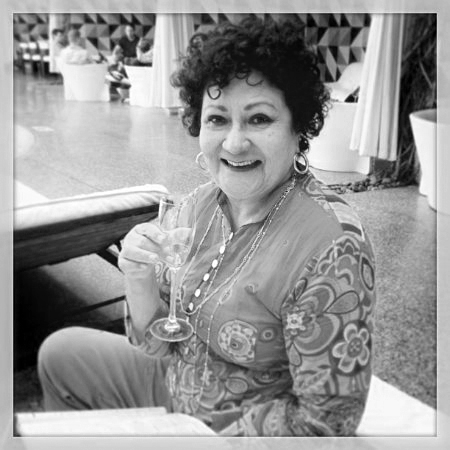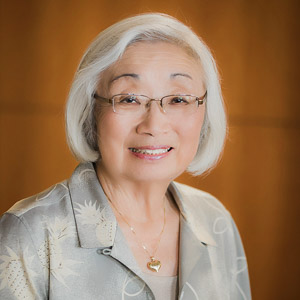Thank You To Our Outgoing Board Members
This year, we say goodbye to two of our board members as they finish their terms of service with Metta Fund. Over the past decade, Sandy Mori and Beverly Hayon have played instrumental roles in guiding our mission with invaluable insights and unique expertise. Not only have they contributed to the success and development of our organization, but they’ve also helped deepen our impact as we strive towards advancing the health and wellness of San Franciscans. Sandy’s leadership and commitment to our city’s aging community and Beverly’s energy and creativity has been an incredible asset to Metta Fund. We are grateful for their time, commitment, and enthusiasm. We took the opportunity for informal question-and-answer sessions so Sandy and Beverly could share their insight about their time with Metta Fund.
Q&A with Sandy Mori
Tell us how you first got involved with Metta Fund.
I first learned about Metta Fund in the mid-2000s from Jan Masaoka, a well-known and influential nonprofit leader, who was engaged in some consulting work with the foundation at the time. As past Executive Secretary to the San Francisco Health Commission, I was enticed by the potential of this fairly-new health foundation, and the more I learned about Metta’s work, the more I believed there was great impact to be made. Metta Fund began recruiting new board members not soon after; given Metta Fund’s focus on health and wellbeing for the residents of San Francisco, I felt I could make meaningful contributions at the board-level. I officially joined the board in 2009 and am now completing by ninth and final year.
You have a long career working with organizations dedicated to older people. What initially led you into the aging space?
I have always strived to make positive impact on behalf of my community. As long as I can remember, civil rights work has been integral to who I am. My background is relevant because I am Sansei, a third-generation Japanese American who was born at the Tule Lake Japanese internment camp, one of ten concentration camps built to imprison Japanese Americans forcibly removed from the West Coast states during World War II. The trauma and racism my family experienced during that time obviously made a lasting impact on me. To that end, I became involved in community and volunteer work initially focused on the Japanese American community. Following college, I participated in a dietetic internship in Detroit, at a time when the 1960s Civil Rights Movement was in full bloom. When I relocated to San Francisco, my work as a therapeutic and administrative dietitian at various hospitals gave me further insight into the many essential needs of our city’s elders.
Tell us more about your many years with Kimochi Inc.
As a volunteer in the Japanese American community in San Francisco in the early 1970s, I was intimately familiar with the needs, struggles, challenges, and opportunities that existed within the sector. As a dietitian, I was passionate not only about nutritious food, but also about creating programs and services to benefit older people. So, I became a community advocate and volunteered my time. In 1971, Steve Nakajo and I cofounded Kimochi Inc. to provide culturally sensitive care for the Japanese American community. And after I learned about funding that was available to benefit a nutrition program for seniors, the state’s first “ethnic meals program” was created in 1974. I later went on staff to oversee operations and fundraising and departed when I was appointed to San Francisco’s Health Commission to serve as the liaison between the Department of Public Health and the Health Directors. Today, Kimochi Inc. is an anchor institution in San Francisco’s Japantown, providing a wide variety of programs and focusing on developing services to meet the emerging needs of Sansei baby boomers.
As you know, Metta has a commitment to San Francisco’s aging population. And there is more and more research that talks about the correlation between loneliness, isolation, and health in older folks. Why do you think social isolation has become so widespread and problematic in our country, specifically for our older demographic?
We are forgetting people as they age. Of course that is not our intention, but our modern society unfortunately does not put sufficient emphasis on respect and care for our elders. We need to teach younger generations and instill in our community that we need to take care of our aging community members.
On a personal level, what do you do to stay connected to your community?
I come from a busy family that was always active and spent time volunteering. Particularly my father was a very active volunteer, not only in the church but the wider community. In the same way, I stay active via my board and volunteer community work.
What advice would you have for a peer who may be feeling lonely or isolated?
Of course, it’s easier said than done, but I believe that getting out and meeting people is important. New connections can help ease feelings of loneliness and provide new meaning. It’s important to stay active. As the saying goes, “you use it or lose it!”
You’ve served on Metta Fund’s board for nine years now, and we are so grateful. What’s one piece of advice you have for us, here at Metta Fund?
Stay the course! The needs of our elders need to be addressed, and there is much work to do.
Q&A with Beverly Hayon

Prior to my career in the public sector, I worked in local broadcasting and held a wide variety of roles, including writer, on-air television host, and executive producer. I was Director of Public Affairs at Channel 7 and host of a weekend Public Affairs show on Channel 4 before taking a break from journalism to travel, spend time with family, and explore my entrepreneurial side. In the late 1980s, at the height of the AIDS crisis, I became Director of Public Information at San Francisco’s Public Health Department. Even though we were in the middle of a public health crisis, I found my job extremely fulfilling and realized that I enjoyed working in the public sector. Following my time at the Health Department, I served as Director of National Media Relations at Kaiser Permanente, where I remained for 17 years.
You’ve served as a Board member at Metta Fund for just about a decade. Tell me how you first got involved with Metta Fund.
Following my retirement from Kaiser in 2007, I felt a desire to give back to my community, having previously served on a number of boards and commissions, including the San Francisco Library Commission, the San Francisco Ethics Commission, and San Francisco Commission on the Status of Women. I had served on the Commission on the Status of Women at the same time as Marcia Smolens, a prominent influencer who was a Metta Fund board member in the 2000s. The board was at an inflection point and actively seeking to bring new perspectives to the table. The time was right for me as I was seeking to further contribute as a steward of public good.
Tell me a little more about your board experience at Metta Fund.
It’s been quite the journey and I have thoroughly enjoyed serving as a board member at Metta Fund these past 10 years. I’ve found it to be an utterly gratifying experience because I’ve seen the institution and board members come together with a unified vision to create change. I’ve witnessed firsthand that it is indeed possible to make lasting impact. The foundation transformed from an anonymous funder to an active and collaborative grantmaking institution that brings others to the table. Having worked in the health field, I am especially satisfied with the impression Metta Fund has made on public health in San Francisco. I look forward to seeing what future successes Metta Fund accomplishes hand-in-hand with its many important partners.
Metta now has a commitment to San Francisco’s older adult population. And there is more and more research that talks about the correlation between loneliness, isolation, and health in older folks. Why do you think social isolation has become so widespread and problematic in our country, specifically for our older demographic?
We know that American society has always worshipped the lone ranger. The original ethos of this country is to “leave the old behind;” that includes leaving behind religion, family, material things, etc. Our country is founded on these individualist beliefs. Contributing to these isolating founding beliefs is our corporate and urban society as well as the vast size of this country. It’s a complex social problem. We have to ensure that we help others connect, and we have to work on creating villages and support networks for older people.
What role can philanthropy play in the effort to reduce social isolation and loneliness amongst our aging population?
I believe philanthropy can be instrumental in supporting the community village idea and providing opportunities to connect. That is what is missing in our society. Philanthropy can blow the horn and promote people coming together and fixing things together.
On a personal level, what do you do to stay connected to your community?
I’m quite active with a number of nonprofits and currently also serve as the President of Mission Neighborhood Centers, which I find very fulfilling and has provided a wonderful opportunity to connect with my Latino roots. Of course I also stay quite busy with my family and especially love spending time with my four year old granddaughter.
How would you spend your perfect day in San Francisco?
I’d start the day with a walk in Golden Gate Park, a visit to a local art museum, lunch at Zuni Café, time with my family, and a concert at SF Jazz. That would be the perfect day!
What advice would you have for a peer or friend who may be feeling socially isolated?
In the end, that person has to put forth the initial effort, so I think it’s really important to teach people to reach out. I’d suggest getting out there: meetups, excursions, classes, senior centers, and other things that get you out.
You’ve served on Metta Fund’s board for 10 years now, and we are so grateful. What’s one piece of advice you have for us, here at Metta Fund?
My one piece of advice is for the board to continue to work in unity and work together to achieve Metta Fund’s ambitious goals.
